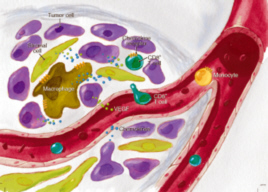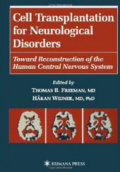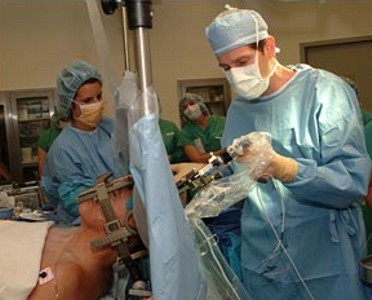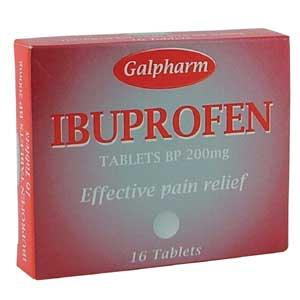25th March 2011 - New research
CHEMOKINES IN PARKINSON'S DISEASE
Neuroimmunomodulation [2011] 18 (4) : 240-244
(Scalzo P, de Miranda AS, Guerra Amaral DC, de Carvalho Vilela M, Cardoso F,
Teixeira AL.)
Complete abstract
Neuro-inflammation is often claimed to be a cause or contributor to the cause of
Parkinson's Disease by damaging or interfering with the dopaminergic neurons
(the cells involved in Parkinson's Disease). Neuro-inflammation is often a
response of the Central Nervous System to injury. Chemokines play a role in the
effect of inflammatory diseases. For more information go to
Chemokines. So the levels of chemokines were compared in people with
and
 without
Parkinson's Disease. The levels of the Chemokines CCL3, CCL11, CCL24,
CXCL8 and CXCL10 were assessed. The levels of the chemokines were then related
to the severity of Parkinson's Disease. Each person with Parkinson's Disease was
assessed using three different measures of Parkinson's Disease. However, the
researchers found no difference in the levels of chemokines between people with
and without Parkinson's Disease. So chemokines are not indicators of Parkinson's
Disease. Also, the idea that Parkinson's Disease is due to inflammation of the
Central Nervous System was largely nullified.
In order to refer to this article on its own
click here.
without
Parkinson's Disease. The levels of the Chemokines CCL3, CCL11, CCL24,
CXCL8 and CXCL10 were assessed. The levels of the chemokines were then related
to the severity of Parkinson's Disease. Each person with Parkinson's Disease was
assessed using three different measures of Parkinson's Disease. However, the
researchers found no difference in the levels of chemokines between people with
and without Parkinson's Disease. So chemokines are not indicators of Parkinson's
Disease. Also, the idea that Parkinson's Disease is due to inflammation of the
Central Nervous System was largely nullified.
In order to refer to this article on its own
click here.
20th
March 2011 - New
book
CELL TRANSPLANTATION FOR NEUROLOGICAL DISORDERS
Thomas B. Freeman (Editor), Hakan Widner
(Editor)
 Publisher's
description : Distinguished medical researchers from around the world review
novel neural reconstructive techniques. The contributors focus on those diseases
for which clinical trials are either ongoing or likely to occur in the near
future. Among the topics reviewed are results and rationale for some of the
leading transplant programs for the treatment of Parkinson's disease, the use of
PET scanning for patient evaluation, autopsy studies of transplant recipients,
transplant immunology, cellular transplantation for the treatment of pain and
stroke, and transplantation of myelinating cells. A full discussion of the
important ethical issues surrounding the use of fetal tissue for transplantation
purposes is also included.
Click here for more details.
For
more books concerning Parkinson's Disease go to
Parkinson's Disease Books.
Publisher's
description : Distinguished medical researchers from around the world review
novel neural reconstructive techniques. The contributors focus on those diseases
for which clinical trials are either ongoing or likely to occur in the near
future. Among the topics reviewed are results and rationale for some of the
leading transplant programs for the treatment of Parkinson's disease, the use of
PET scanning for patient evaluation, autopsy studies of transplant recipients,
transplant immunology, cellular transplantation for the treatment of pain and
stroke, and transplantation of myelinating cells. A full discussion of the
important ethical issues surrounding the use of fetal tissue for transplantation
purposes is also included.
Click here for more details.
For
more books concerning Parkinson's Disease go to
Parkinson's Disease Books.
18th March 2011 - New research
CLINICAL TRIAL RESULTS OF GENE THERAPY FOR
PARKINSON'S DISEASE
The Lancet Neurology, Early Online Publication, 17 March 2011 (P.A.LeWitt,
A.R.Rezai, M.A.Leehey, S.G. Ojemann, A.W.Flaherty, E.N.Eskandar, S.K.Kostyk,
K.Thomas, A.Sarkar, M.S.Siddiqui, S.B.Tatter, J.M.Schwalb, K.L.Poston,
J.M.Henderson, R.M.Kurlan, I. H.Richard, L.Van Meter, C.V.Sapan, M.J.During,
M.G.Kaplitt, A. Feigin)
Complete abstract
A surgical method of increasing the levels of GABA, which is a substance
involved in muscular movement, has resulted in claims of the method being
beneficial for Parkinson's Disease.
AAV2-GAD, which is called NLX-P101, was delivered in to the subthalamic nucleus
of the brains of people with Parkinson's Disease. GAD is the enzyme (a chemical
substance) that makes GABA naturally in the brain. Only a third of the elligible
patients were given the treatment. A third of those elligible had to be excluded
because of technical problems. The other third of those elligible only received
sham surgery (no treatment at all).
 There
was a 23% reduction in symptoms in the third of patients that were treated.
However, even those that were not treated at all reduced their symptoms by
nearly 13%. So the actual benefit of the surgical method used was only a 10%
reduction in symptoms in those that were treated. Of the adverse events
experienced, the most common were headache and nausea. The study was carried out
for only six months. It is normal for any artificial stimulation of a
biochemical function, as occurred in this study, to eventually start reversing
due to a process called feedback inhibition. In order to refer to this article
on its own
click here.
There
was a 23% reduction in symptoms in the third of patients that were treated.
However, even those that were not treated at all reduced their symptoms by
nearly 13%. So the actual benefit of the surgical method used was only a 10%
reduction in symptoms in those that were treated. Of the adverse events
experienced, the most common were headache and nausea. The study was carried out
for only six months. It is normal for any artificial stimulation of a
biochemical function, as occurred in this study, to eventually start reversing
due to a process called feedback inhibition. In order to refer to this article
on its own
click here.
16th March 2011 - New research
HIGH PREVALENCE OF VITAMIN D DEFICIENCY IN
PARKINSON'S DISEASE
Archives of Neurology [2011] 68 (3) : 314-319 (Evatt
ML, Delong MR, Kumari M, Auinger P, McDermott MP, Tangpricha V)
Complete abstract
Vitamin D insufficiency has been reported to be far more common in people with
Parkinson's Disease, but it is not clear whether having a chronic disease
causing reduced mobility contributes to this relatively high prevalence. Nearly
70% of people with early Parkinson's Disease have an insufficiency of vitamin D.
The prevalence of vitamin D insufficiency in people with early Parkinson's
Disease was similar to or higher than those reported in previous studies.
Vitamin D concentrations did not decline with the worsening of Parkinson's
Disease. People with Parkinson's Disease were also previously found to be prone
to Osteoporosis, which is a bone disorder related to vitamin D deficiency. For
more information go to
The high prevalence of Osteoporosis in Parkinson's Disease.
 The
researchers offer no explanation as to why vitamin D deficiency is so high in
early Parkinson's Disease.
Vitamin D is not essential for the formation of dopamine, the substance
whose deficiency causes Parkinson's Disease. Vitamin D is obtained from
sunshine, but can be more readily obtained in vitamin and mineral supplements,
many of which include sufficient vitamin D to prevent a deficiency of vitamin D
from occurring. In order to refer to this article on its own
click here.
The
researchers offer no explanation as to why vitamin D deficiency is so high in
early Parkinson's Disease.
Vitamin D is not essential for the formation of dopamine, the substance
whose deficiency causes Parkinson's Disease. Vitamin D is obtained from
sunshine, but can be more readily obtained in vitamin and mineral supplements,
many of which include sufficient vitamin D to prevent a deficiency of vitamin D
from occurring. In order to refer to this article on its own
click here.
12th
March 2011 - New
book
IT COULD HAPPEN...A BASEBALL FANTASY
Lou Nagy
 Publisher's
description : Baseball fiction and fantasy at it's most unusual. Imagine finding
out that you have an incurable disease. Then imagine that the medicine you are
given takes you way beyond "normal." You become better at things requiring
hand-eye coordination than anyone has ever been ! What would you do upon
discovering this incredible ability ? Cole Anderson decides to try out for Major
League Baseball. The author Lou Nagy has had Parkinson's since 1984. At that
time he was only 31. Since then his life and thoughts have been consumed by this
disease. It is relentless and doesn't give any breaks. He must take 20 or more
well timed pills each day just to walk, talk and live any sort of life at all.
Yet he still dreams like all of us do.
Click here for more details.
For
more books concerning Parkinson's Disease go to
Parkinson's Disease Books.
Publisher's
description : Baseball fiction and fantasy at it's most unusual. Imagine finding
out that you have an incurable disease. Then imagine that the medicine you are
given takes you way beyond "normal." You become better at things requiring
hand-eye coordination than anyone has ever been ! What would you do upon
discovering this incredible ability ? Cole Anderson decides to try out for Major
League Baseball. The author Lou Nagy has had Parkinson's since 1984. At that
time he was only 31. Since then his life and thoughts have been consumed by this
disease. It is relentless and doesn't give any breaks. He must take 20 or more
well timed pills each day just to walk, talk and live any sort of life at all.
Yet he still dreams like all of us do.
Click here for more details.
For
more books concerning Parkinson's Disease go to
Parkinson's Disease Books.
9th March 2011 - New research
DIABETICS INCREASED RISK OF PARKINSON'S DISEASE
Diabetes Care [2011] Mar 4 [Epub ahead of print] (Xu
Q, Park Y, Huang X, Hollenbeck A, Blair A, Schatzkin A, Chen H.)
Complete abstract
 Researcher's
have found that there is an increased risk of Parkinson's Disease amongst
diabetics. In a study involving over a quarter of a million people the risk of
Parkinson's Disease amongst diabetics was increased by 40%. Further analysis
showed that the increased risk was largely limited to people who had diabetes
for more than 10 years at the time of the survey. In those people the risk of
developing Parkinson's Disease was increased even more, by 75%. What the
researchers have not explained is why this likelihood occurs. The biochemistry
of diabetes and Parkinson's Disease are distinct.
However, both diabetes and Parkinson's
Disease
increase in prevalence with age. In order to refer to this article on its own
click here.
Researcher's
have found that there is an increased risk of Parkinson's Disease amongst
diabetics. In a study involving over a quarter of a million people the risk of
Parkinson's Disease amongst diabetics was increased by 40%. Further analysis
showed that the increased risk was largely limited to people who had diabetes
for more than 10 years at the time of the survey. In those people the risk of
developing Parkinson's Disease was increased even more, by 75%. What the
researchers have not explained is why this likelihood occurs. The biochemistry
of diabetes and Parkinson's Disease are distinct.
However, both diabetes and Parkinson's
Disease
increase in prevalence with age. In order to refer to this article on its own
click here.
8th March 2011 - New research
JAPANESE SAKE TRIPLES THE RISK OF PARKINSON'S
DISEASE
BMC Neurology [2010] 10 :
111 (Fukushima W, Miyake Y, Tanaka K, Sasaki S, Kiyohara C, Tsuboi Y, Yamada T,
Oeda T, Miki T, Kawamura N, Sakae N, Fukuyama H, Hirota Y, Nagai M)
Complete abstract
 Drinking
the Japanese rice wine Sake has been found to triple the likelihood of
developing Parkinson's Disease. Sake has been drunk in Japan for over a thousand
years, and is often used in ceremonies in Japan. It is now drunk all over the
world. For more
information go to
Sake.
Some studies have previously found that
alcohol lessens the likelihood of Parkinson's Disease. However, the majority of
studies did not find any significant association. This study also found no
association between drinking alcohol consumption and Parkinson's Disease, apart
from the considerable effect of Sake. In order to refer to this article on its
own
click here.
Drinking
the Japanese rice wine Sake has been found to triple the likelihood of
developing Parkinson's Disease. Sake has been drunk in Japan for over a thousand
years, and is often used in ceremonies in Japan. It is now drunk all over the
world. For more
information go to
Sake.
Some studies have previously found that
alcohol lessens the likelihood of Parkinson's Disease. However, the majority of
studies did not find any significant association. This study also found no
association between drinking alcohol consumption and Parkinson's Disease, apart
from the considerable effect of Sake. In order to refer to this article on its
own
click here.
5th March 2011 - New research
USE OF IBUPROFEN AND THE RISK OF PARKINSON'S
DISEASE
Neurology [2011] Mar 2
[Epub ahead of print] (Gao X, Chen H, Schwarzschild MA, Ascherio A.)
Complete abstract
 Use
of non-steroidal anti-inflammatory drugs (NSAID) in general, and possibly
Ibuprofen in particular, has been claimed to be related to a lower risk of
Parkinson's Disease. It has consequently been claimed that neuro-inflammation
may contribute to the cause of Parkinson Disease. The risk of Parkinson's
Disease in those people taking Ibuprofen was reduced to 62%. There was also a
relationship between Parkinson's Disease and the dosage taken per week. However,
other drugs of the same type, including aspirin and other NSAIDS, did not lessen
the risk of Parkinson's Disease. Other NSAIDS actually increased the risk of
Parkinson's Disease. The authors suggest that Ibuprofen should be further
investigated for its potential use in Parkinson's Disease.
Use
of non-steroidal anti-inflammatory drugs (NSAID) in general, and possibly
Ibuprofen in particular, has been claimed to be related to a lower risk of
Parkinson's Disease. It has consequently been claimed that neuro-inflammation
may contribute to the cause of Parkinson Disease. The risk of Parkinson's
Disease in those people taking Ibuprofen was reduced to 62%. There was also a
relationship between Parkinson's Disease and the dosage taken per week. However,
other drugs of the same type, including aspirin and other NSAIDS, did not lessen
the risk of Parkinson's Disease. Other NSAIDS actually increased the risk of
Parkinson's Disease. The authors suggest that Ibuprofen should be further
investigated for its potential use in Parkinson's Disease.
However, Ibuprofen has
never been shown to reduce Parkinson's Disease. Also, it has also not been
proven that the claimed relationship between Ibuprofen and Parkinson's Disease
is directly due to Ibuprofen. Long term use of Ibuprofen is also known to
be able to cause serious side effects. For more information go to
Ibuprofen. In previous studies, the risk of
Parkinson's Disease in people taking Ibuprofen was found to be greater than in
the present study at 76%
complete abstract,
and 85%
complete abstract.
In order to refer to this article on its own
click here.
2nd March 2011 - New resource
NEW RESOURCE FOR RECORDING PARKINSON'S DISEASE
DRUGS AND SYMPTOMS
 DataDriven
Health Care Solutions have introduced an Internet resource MyPDLog for recording
the names, times, and dosages of Parkinson's Disease medications that are taken,
as well as mood and symptoms. Patients log
into their account, and enter their medications, dosage times, dyskinesias,
ON/OFF times, moods, and journals. Everything is automated. This means no more
missed entries, inaccurate times, or bad data. It is a reliable way of
collecting critical information that can be used by patients themselves, or by
doctors in order to record the data of their patients. For their web site go to
DataDriven Health
Care Solutions. In order to refer to this article on its own
click here.
DataDriven
Health Care Solutions have introduced an Internet resource MyPDLog for recording
the names, times, and dosages of Parkinson's Disease medications that are taken,
as well as mood and symptoms. Patients log
into their account, and enter their medications, dosage times, dyskinesias,
ON/OFF times, moods, and journals. Everything is automated. This means no more
missed entries, inaccurate times, or bad data. It is a reliable way of
collecting critical information that can be used by patients themselves, or by
doctors in order to record the data of their patients. For their web site go to
DataDriven Health
Care Solutions. In order to refer to this article on its own
click here.
.gif)
.gif)
 without
Parkinson's Disease. The levels of the Chemokines CCL3, CCL11, CCL24,
CXCL8 and CXCL10 were assessed. The levels of the chemokines were then related
to the severity of Parkinson's Disease. Each person with Parkinson's Disease was
assessed using three different measures of Parkinson's Disease. However, the
researchers found no difference in the levels of chemokines between people with
and without Parkinson's Disease. So chemokines are not indicators of Parkinson's
Disease. Also, the idea that Parkinson's Disease is due to inflammation of the
Central Nervous System was largely nullified.
In order to refer to this article on its own
without
Parkinson's Disease. The levels of the Chemokines CCL3, CCL11, CCL24,
CXCL8 and CXCL10 were assessed. The levels of the chemokines were then related
to the severity of Parkinson's Disease. Each person with Parkinson's Disease was
assessed using three different measures of Parkinson's Disease. However, the
researchers found no difference in the levels of chemokines between people with
and without Parkinson's Disease. So chemokines are not indicators of Parkinson's
Disease. Also, the idea that Parkinson's Disease is due to inflammation of the
Central Nervous System was largely nullified.
In order to refer to this article on its own
 Publisher's
description : Distinguished medical researchers from around the world review
novel neural reconstructive techniques. The contributors focus on those diseases
for which clinical trials are either ongoing or likely to occur in the near
future. Among the topics reviewed are results and rationale for some of the
leading transplant programs for the treatment of Parkinson's disease, the use of
PET scanning for patient evaluation, autopsy studies of transplant recipients,
transplant immunology, cellular transplantation for the treatment of pain and
stroke, and transplantation of myelinating cells. A full discussion of the
important ethical issues surrounding the use of fetal tissue for transplantation
purposes is also included.
Publisher's
description : Distinguished medical researchers from around the world review
novel neural reconstructive techniques. The contributors focus on those diseases
for which clinical trials are either ongoing or likely to occur in the near
future. Among the topics reviewed are results and rationale for some of the
leading transplant programs for the treatment of Parkinson's disease, the use of
PET scanning for patient evaluation, autopsy studies of transplant recipients,
transplant immunology, cellular transplantation for the treatment of pain and
stroke, and transplantation of myelinating cells. A full discussion of the
important ethical issues surrounding the use of fetal tissue for transplantation
purposes is also included.
 There
was a 23% reduction in symptoms in the third of patients that were treated.
However, even those that were not treated at all reduced their symptoms by
nearly 13%. So the actual benefit of the surgical method used was only a 10%
reduction in symptoms in those that were treated. Of the adverse events
experienced, the most common were headache and nausea. The study was carried out
for only six months. It is normal for any artificial stimulation of a
biochemical function, as occurred in this study, to eventually start reversing
due to a process called feedback inhibition. In order to refer to this article
on its own
There
was a 23% reduction in symptoms in the third of patients that were treated.
However, even those that were not treated at all reduced their symptoms by
nearly 13%. So the actual benefit of the surgical method used was only a 10%
reduction in symptoms in those that were treated. Of the adverse events
experienced, the most common were headache and nausea. The study was carried out
for only six months. It is normal for any artificial stimulation of a
biochemical function, as occurred in this study, to eventually start reversing
due to a process called feedback inhibition. In order to refer to this article
on its own
 The
researchers offer no explanation as to why vitamin D deficiency is so high in
early Parkinson's Disease.
Vitamin D is not essential for the formation of dopamine, the substance
whose deficiency causes Parkinson's Disease. Vitamin D is obtained from
sunshine, but can be more readily obtained in vitamin and mineral supplements,
many of which include sufficient vitamin D to prevent a deficiency of vitamin D
from occurring. In order to refer to this article on its own
The
researchers offer no explanation as to why vitamin D deficiency is so high in
early Parkinson's Disease.
Vitamin D is not essential for the formation of dopamine, the substance
whose deficiency causes Parkinson's Disease. Vitamin D is obtained from
sunshine, but can be more readily obtained in vitamin and mineral supplements,
many of which include sufficient vitamin D to prevent a deficiency of vitamin D
from occurring. In order to refer to this article on its own
 Publisher's
description : Baseball fiction and fantasy at it's most unusual. Imagine finding
out that you have an incurable disease. Then imagine that the medicine you are
given takes you way beyond "normal." You become better at things requiring
hand-eye coordination than anyone has ever been ! What would you do upon
discovering this incredible ability ? Cole Anderson decides to try out for Major
League Baseball. The author Lou Nagy has had Parkinson's since 1984. At that
time he was only 31. Since then his life and thoughts have been consumed by this
disease. It is relentless and doesn't give any breaks. He must take 20 or more
well timed pills each day just to walk, talk and live any sort of life at all.
Yet he still dreams like all of us do.
Publisher's
description : Baseball fiction and fantasy at it's most unusual. Imagine finding
out that you have an incurable disease. Then imagine that the medicine you are
given takes you way beyond "normal." You become better at things requiring
hand-eye coordination than anyone has ever been ! What would you do upon
discovering this incredible ability ? Cole Anderson decides to try out for Major
League Baseball. The author Lou Nagy has had Parkinson's since 1984. At that
time he was only 31. Since then his life and thoughts have been consumed by this
disease. It is relentless and doesn't give any breaks. He must take 20 or more
well timed pills each day just to walk, talk and live any sort of life at all.
Yet he still dreams like all of us do.
 Researcher's
have found that there is an increased risk of Parkinson's Disease amongst
diabetics. In a study involving over a quarter of a million people the risk of
Parkinson's Disease amongst diabetics was increased by 40%. Further analysis
showed that the increased risk was largely limited to people who had diabetes
for more than 10 years at the time of the survey. In those people the risk of
developing Parkinson's Disease was increased even more, by 75%. What the
researchers have not explained is why this likelihood occurs. The biochemistry
of diabetes and Parkinson's Disease are distinct.
However, both diabetes and Parkinson's
Disease
increase in prevalence with age. In order to refer to this article on its own
Researcher's
have found that there is an increased risk of Parkinson's Disease amongst
diabetics. In a study involving over a quarter of a million people the risk of
Parkinson's Disease amongst diabetics was increased by 40%. Further analysis
showed that the increased risk was largely limited to people who had diabetes
for more than 10 years at the time of the survey. In those people the risk of
developing Parkinson's Disease was increased even more, by 75%. What the
researchers have not explained is why this likelihood occurs. The biochemistry
of diabetes and Parkinson's Disease are distinct.
However, both diabetes and Parkinson's
Disease
increase in prevalence with age. In order to refer to this article on its own
 Drinking
the Japanese rice wine Sake has been found to triple the likelihood of
developing Parkinson's Disease. Sake has been drunk in Japan for over a thousand
years, and is often used in ceremonies in Japan. It is now drunk all over the
world. For more
information go to
Drinking
the Japanese rice wine Sake has been found to triple the likelihood of
developing Parkinson's Disease. Sake has been drunk in Japan for over a thousand
years, and is often used in ceremonies in Japan. It is now drunk all over the
world. For more
information go to
 Use
of non-steroidal anti-inflammatory drugs (NSAID) in general, and possibly
Ibuprofen in particular, has been claimed to be related to a lower risk of
Parkinson's Disease. It has consequently been claimed that neuro-inflammation
may contribute to the cause of Parkinson Disease. The risk of Parkinson's
Disease in those people taking Ibuprofen was reduced to 62%. There was also a
relationship between Parkinson's Disease and the dosage taken per week. However,
other drugs of the same type, including aspirin and other NSAIDS, did not lessen
the risk of Parkinson's Disease. Other NSAIDS actually increased the risk of
Parkinson's Disease. The authors suggest that Ibuprofen should be further
investigated for its potential use in Parkinson's Disease.
Use
of non-steroidal anti-inflammatory drugs (NSAID) in general, and possibly
Ibuprofen in particular, has been claimed to be related to a lower risk of
Parkinson's Disease. It has consequently been claimed that neuro-inflammation
may contribute to the cause of Parkinson Disease. The risk of Parkinson's
Disease in those people taking Ibuprofen was reduced to 62%. There was also a
relationship between Parkinson's Disease and the dosage taken per week. However,
other drugs of the same type, including aspirin and other NSAIDS, did not lessen
the risk of Parkinson's Disease. Other NSAIDS actually increased the risk of
Parkinson's Disease. The authors suggest that Ibuprofen should be further
investigated for its potential use in Parkinson's Disease.
 DataDriven
Health Care Solutions have introduced an Internet resource MyPDLog for recording
the names, times, and dosages of Parkinson's Disease medications that are taken,
as well as mood and symptoms. Patients log
into their account, and enter their medications, dosage times, dyskinesias,
ON/OFF times, moods, and journals. Everything is automated. This means no more
missed entries, inaccurate times, or bad data. It is a reliable way of
collecting critical information that can be used by patients themselves, or by
doctors in order to record the data of their patients. For their web site go to
DataDriven
Health Care Solutions have introduced an Internet resource MyPDLog for recording
the names, times, and dosages of Parkinson's Disease medications that are taken,
as well as mood and symptoms. Patients log
into their account, and enter their medications, dosage times, dyskinesias,
ON/OFF times, moods, and journals. Everything is automated. This means no more
missed entries, inaccurate times, or bad data. It is a reliable way of
collecting critical information that can be used by patients themselves, or by
doctors in order to record the data of their patients. For their web site go to